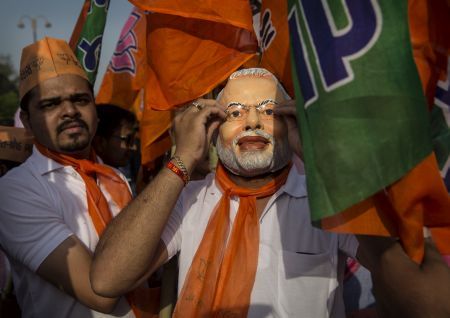 Factors such as industrial backwardness, crime, poor infrastructure, erratic power supply and poor educational infrastructure will take a backseat to identity, reports Aditi Phadnis.
Factors such as industrial backwardness, crime, poor infrastructure, erratic power supply and poor educational infrastructure will take a backseat to identity, reports Aditi Phadnis.
Election war rooms in Patna are agog and desperately busy. This week is going to be crucial for all the parties in Bihar. In the two areas that are going to the polls -- one on Monday, and the other on October 16 -- the fate of 81 of the 243 assembly constituencies will be decided, around 30 per cent of the election will be over as the week ends. Here are the reasons why the two phases are so important.
Consider the data. In 2010, the Janata Dal-United got the highest number of seats – 29 of the 49 seats, followed by the Bharatiya Janata Party with 13.
Remember, the BJP and JD-U were contesting as an alliance then. Now, it is the Rashtriya Janata Dal, which is JD-U’s alliance partner. And the RJD got just four assembly seats in the region. That is why the BJP is working so hard to perform well in this phase.
Numerically, the second phase is equally interesting. Thirty-two constituencies will go to the polls. Of these, in 2010, the JD-U got the lion’s share with18. The BJP, which contested in alliance with the JD-U, got nine. The RJD got just two seats and the Lok Janshakti Party got one. The Independents won two seats.
Understandably, there is anxiety all around. This election will decide whether the large number of seats won by the JD-U had anything to do with the transfer of votes to it -- that belonged to the BJP. On the other hand, it is true that in many areas, the BJP in 2015 did not have candidates to field, simply because in some places it had no organisation, for it had left the field free for the JD-U. Moreover, there might be a silent RJD vote that will transfer to the JD-U this time, replacing the BJP vote.
Confused? So are the political parties, the principal actors. Little wonder, then that most political and non-political actors are saying this is an election that will be down to the wire, and will be decided as much on the basis of issues of identity (caste, religion, etc.) as on governance.
There are stark examples of an overlap of caste and governance (or the lack of it). Prabhat Khabar’s reporter Pushyamitra says about Gaya (to go to the polls on October 16) that large swathes of the region have drinking water, contaminated by fluorides. In Gaya district alone, the number of settlements affected by disease caused by contaminated drinking water is 517. Most of the families are Ravidasi, a small Dalit sect, not as vocal and powerful as the Paswans or the Musahars -- in other words, not big enough to be electorally assertive. But the region highlights the politics around water.
The plight of those affected by fluorosis (a chronic condition caused by excessive intake of fluorine compounds), Pushyamitra says, is unimaginable. He met one family where both the husband and wife are affected by the disease. They just about manage to live. The wife is stretched out on a cot all day; she suffers from severe pain in the joints, tremors and lack of muscle coordination. Lately, she has developed sores, the family told him, and flies keep feeding on them but she doesn’t have the energy to drive the flies away. The husband is mobile but just about. He collects grains that have been left behind on the fields, manages to make gruel of it and the family survives on that.
There is a water treatment plant because officials from the state’s water department came five years ago and painted all the hand pumps red -- in other words don’t drink the water, it isn’t safe. But the treatment plant is near the village mukhiya’s home. Pipes were paid to extend it to the Ravidasi mohalla. But a road was made and the pipes were broken. No one has fixed them since. The mukhiya has extended an open invitation -- anyone who wants water can come and take it from his home. But he won’t get the pipe fixed.
According to the statistics available with the Bihar government, Pushyamitra says, 4,157 settlements in 11 districts in Bihar get contaminated drinking water. These districts are Nalanda, Aurangabad, Bhagalpur, Nawada, Rohtas, Kaimur, Gaya, Munger, Banka, Jamui and Sheikhpura. Many of these regions will cast a vote this week. Will their voting make a difference? Pushyamitra doubts. Amid issues of caste and governance, does clean drinking water figure anywhere? Apparently not. Neither Prime Minister Narendra Modi, nor Chief Minister Nitish Kumar has flagged it. The candidates in the election would rather not talk about it.
Industrial backwardness, crime, poor infrastructure, erratic power supply and poor educational infrastructure are only some of the problems facing this region. All these will weigh in when the area votes this week.
Image: BJP and PM Modi supporters chant slogans and wave the party flag at a rally. Photograph: Getty Images









